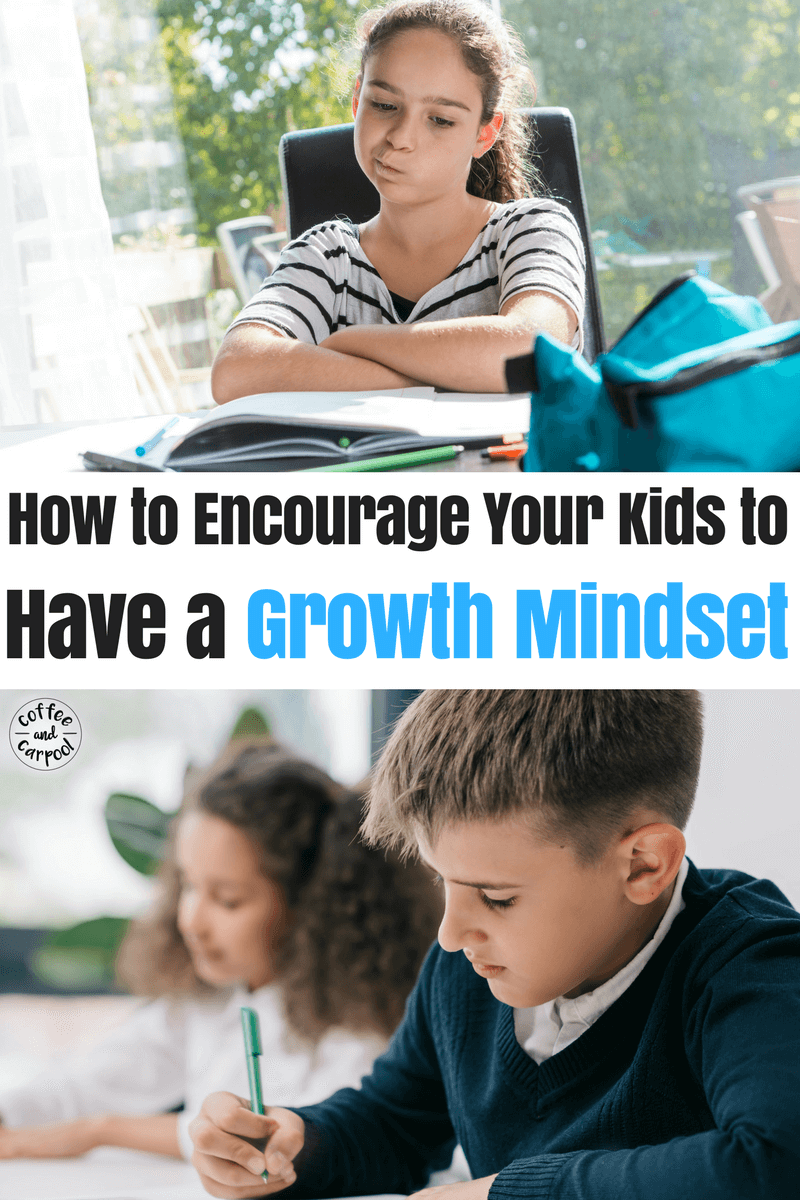Inside: To encourage your child to have a growth mindset there are four simple things you can do that will set them up for academic success and be lifelong learners.
My middle kiddo has always been one or two steps behind his peers in school.
He’s super creative and has plenty of superpowers, but traditional school skills are not one of them.
He reads slower than his peers.
He can’t spell words correctly to save his life.
And he often thinks punctuation and capitalization rules only loosely apply to him and his writing.
So when he was faced with biweekly timed math fact tests in 2nd grade this year, I knew we were in for some turbulence.
He can add and subtract, but there was no way he could do 60 problems in under 2 minutes.
And while I don’t place tremendous value on my son adding 60 problems in under 2 minutes, I do find value in him knowing his math facts without using his fingers.
And I definitely find value in him having a goal and working towards it until he accomplishes his goal.
Because that’s what builds up his growth mindset.
But this wasn’t going to be easy…for him or us.

What is a growth mindset and why is it important?
Not everything in life is easy or comes naturally to us.
People with a fixed mindset believe that whatever skills they have are pretty much set in stone. They can either do something or they can’t. They are either good at something or they’re not.
So if my son had a fixed mindset, he would be convinced that he is a bad speller, a poor reader, and bad at math.
But people with a growth mindset believe that skills can be learned, problems can be solved, and we can improve over time with hard work.
So my son knew that while he couldn’t do his 60 math problems yet, he would be able to do it eventually.
But how could we get him there?
How could we help him reach his big goal and continue to build up his growth mindset?
How can you encourage your child to have a growth mindset?
With our older daughter, we had mistakenly been encouraging a fixed mindset and had to backtrack and work hard to build up her growth mindset.

But by the time my son was in school, we were able to focus on a growth mindset attitude from the very beginning by doing 5 things.
1. We focus on problem-solving skills:
We had to purposefully teach my son problem-solving skills.
And a huge part of that was NOT solving my son’s problem for him right away.
We had to let him struggle for a while so he could feel what it’s like to struggle.
It helped my son realize that not only is it okay to struggle and feel frustrated, he will survive it.
He will get through it.
And he began to realize there are usually several solutions to figure out how to solve the problem or task at hand.
We often remind him of ways he could solve the problem when he’s stuck: reread it, break it down, draw a picture, try it again, think about other problems that are similar and use what you already know.
And we don’t help him until he’s tried several problem-solving tactics.
2. We break down big goals into mini goals:
Passing a 60 problem timed test wasn’t going to happen on his first try. And it seemed like an insurmountable mountain to climb.
He started off with a “No way can I do this” attitude.
So we set a timer and he finished about half the problems. And then we set a timer again and this time, he got a few more problems done.
Success!
He learned his mini goal wasn’t to get to the bottom of the sheet. It was to get better each time he practiced.
And he then knew he had to practice often to reach the bigger goal of finishing all the problems on the sheet.
He couldn’t control how fast his classmates were passing the tests.
But he can control how many times a day he practiced.
And if test day came and he wasn’t able to finish all the problems yet, he knew he just needed more practice to be ready to pass.

3. We model growth mindset behavior in our own actions:
Our kids are watching our every move.
We can use this to our advantage and model the behaviors we want them to have.
I let my kids know when I have a problem that I don’t know how to solve yet. I let them see me struggle.
I talk to them about how I’m going to attack my problem by setting up mini goals so I can reach my bigger goal.
I purposefully walk them through it because I don’t want them to think I’m perfect and everything comes easily to me.
4. We praise effort rather than the outcome:
Instead of getting excited when my son passed a timed test, we praised his effort.
We commented on how proud he must be of himself. And we told him we’re proud that he kept practicing until he was able to finish all the problems correctly.
And we often tell him, “You’re the kind of kid who…” and then we fill in the blanks. For this moment, we usually end it with “works hard and keeps trying until you meet your goal.”
Because a “failed” test wasn’t the end of the world in our house.
Instead, it is a, “Well, let’s keep practicing until you get it” moment.
Likewise, a passed test wasn’t something to get crazy excited about.
Instead, it was, “You worked really hard on that, so let’s start practicing on your next, harder timed-test.”
We celebrated growth, progress, and improvement rather than the actual test-passing.
5. We changed the way we reacted to his grades:
Focusing on grades is paying attention to the outcome rather than the effort.
Yes, of course, we want our kids to be successful in school.
But I would rather have a kid who tries their hardest and improves, but still gets lower grades to a kid who aces almost everything but can’t solve the simplest of problems on their own.
So instead of getting excited about A’s and offering congratulations, we took the emotion out of it and saw academic grades for what they really are: communication.
“You got an ‘A.’ That tells me you understood the material and it felt easy to you,” OR “The ‘A’ tells me you studied and you worked hard to learn the material. I value how hard you worked to earn that ‘A’.”
And likewise: “You got a ‘D’ or you didn’t pass the test. That tells me you didn’t understand the material or you weren’t paying attention or you didn’t follow the directions or you need more practice. We can figure out how to fix that.”
Related: The Real Reason Teachers Assign Homework and How It Can Help Your Child
Because we realized when we celebrated our son’s hard work rather than whether or not he knows his math facts and can prove it on a piece of paper, he was far more self-motivated to keep trying, keep getting faster, and wanting to improve.
Which ultimately made him more successful.
Yes, I’m glad he learned his math facts.
But I’m way more proud that he saw a big mountain in front of him, decided he needed to reach the top, figured out how to get there, and then worked every day to reach the top.
Being at the top of the mountain is exciting. But the fact that he wanted to climb the mountain is way more exciting.
And the fact he has a growth mindset and knows he can climb any mountain he wants to is one of the best gifts I can give him.
Even if he can’t spell the word “mountain” yet.
We’re still working on that skill.

Do you want your child to have a growth mindset? Help them attack their school work based on their learning style and personality? Click here:



Leave a Reply